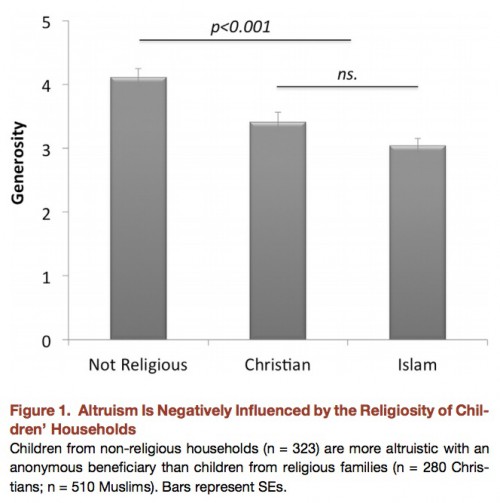You can read this new paper in Current Biology titled The Negative Association between Religiousness and Children’s Altruism across the World and see for yourself — religiosity is not a good thing for fostering generosity, it seems. The authors are a truly international group who tested children from Canada, China, Jordan, Turkey, USA, and South Africa with a set of games, and got a set of results that showed a statistically significant difference in the degree of altruism for different religions, or lack thereof. Here’s how the results look:
I have some quibbles, though. Testing in a classroom with games may not be the best measure of how people deal with one another in real-life situations; maybe godless kids take the abstractions of a game more seriously. Although the authors say they analyzed the data for different parameters and only the religious factor popped out as significant, a lot of the behavior of these groups is going to be correlated with multiple factors: a Muslim child in Chicago might feel more oppressed than a Muslim child in Turkey, so there’s opportunities for all kinds of bias to creep in. There’s virtually no breakdown of the distribution of religion with locale in the paper: we’re told how many Christian, Muslim, and atheist children were tested, but nothing about the geographic proportions of each. But the take-home message from this paper is clear, and I’m just naturally suspicious of results that so neatly confirm my biases.
Family religious identification decreases children’s altruistic behaviors
Religiousness predicts parent-reported child sensitivity to injustices and empathy
Children from religious households are harsher in their punitive tendencies
They also argue that their statistics rule out certain alternative explanations for the differences.
Here, we show that religiosity, as indexed by three different measures, is not associated with increased altruism in young children. Our findings robustly demonstrate that children from households identifying as either of the two major world religions (Christianity and Islam) were less altruistic than children from non-religious households. Moreover, the negative relation between religiousness and spirituality and altruism changes across age, with those children with longer experience of religion in the household exhibiting the greatest negative relations. Of additional note is that the sharing of resources was with an anonymous child beneficiary from the same school and similar ethnic group. Therefore, this result cannot be simply explained by in-group versus out-group biases that are known to change children’s cooperative behaviors from an early age, nor by the known fact that religious people tend to be more altruistic toward individuals from their in-group.
Except that in some places, you might have a reasonable expectation about whether a random, anonymous person would be a member of your in-group.
With some reservations, though, I guess I shouldn’t trust the religious kids to share their stickers with me. But wait! This knowledge would make me less altruistic if I were playing a game with a population I suspected to be largely Christian or Muslim. So would reading this paper first modify the behavior of atheists in America? Oh, man, psychology studies make my brain hurt.




I don’t think there’s much surprise there. While Abrahamaic religions teach virtues, they also teach judgment and punishment. Consequence looms pretty damn large in the religious writ, what with all that afterlife belief.
…which is why you’re a good scientist. If only creationists and IDers had such scruples.
I got to hear a conversation between a former waitress and a new restaurant owner, last night, agreeing that the Sunday morning church crowd are lousy tippers. The owner added that he would ask as they paid if they wanted to add a tip to their bill, and they would say they had left a tip on the table, but they had not.
In my school experience, the vocally-religious kids are jerks.
Very last line of the paper:
“This research was supported by a grant from the John Templeton Foundation”
So even though it may confirm your biases PZ; it presumably doesn’t confirm the biases of the sponsors…
This does make me slightly happier this evening :)
They needed better figure legends and a better fig. 2. Their 3D on 2D doesn’t work all that well. If I’m seeing it right though, it seems to suggest that religious children are more clustered in how they behave, with fewer outliers, while non-religious children are more varied. That doesn’t match the SE for fig. 1 though. Their supplemental is helpful at least. For anyone not wanting to wade through the paper, the generosity scale is of 10. So non-religious kids share an average of 4 stickers out of 10, Christians 3.5 and Muslims 3.
Fig. 3 could also be really interesting if one was able to dig more into the data. It showing the harsher judgement, though not a vast difference.
Dictator Game.
I’m calling dibs on the band name.
I’m kind of surprised the SEs aren’t larger. I wouldn’t have thought that all kids valued stickers.
I can imagine the Religious believe that all their charity is handled by their weekly church tithe. (as Carson how taxes should be paid the same amount as one’s tithes).
ugh, [to contnuue strawmanning…]:
This breeds the attitude of refusing tips and refusing to personally donate to an independent charity.
/srawman
I was suspicious of this and was hoping someone would look into it. It seems like a bit of cherry-picking of the data. if the result had said the opposite. It would have been easier to dismiss.
I had the same thoughts about non-religious and religious children from different cultures being lumped together and the limited scope of the tests.
My first thought is that aren’t more religious households also more likely to be conservative? Religion and bad behaviour are plausibly linked, but “conservative” pretty much guarantees that you’re no fun play with.
Kallan Greybe 10: My thoughts exactly. I would suspect the parents’ conservatism and authoritarianism would be the direct cause of the effect they’re seeing. FWIW, the liberal Christians and Muslims I know are much more likely to be empathetic, SJW-types, while conservatives are almost universally entitled shitweasels.
Agree with PZ.
As much as I want to like its conclusions, the study smells.
Chris61
You’d be amaaaaaazed.
When we were doing tuition training, there was A Lot of emphasis on giving stickers regularly for performing set tasks. We got halfway through the fifth and final day and the trainer asked all the high school maths and science teachers to raise their hands, husband meekly raised his along with a few others. The trainer was a very tall, big man with a strong ‘presence’. He put on his stern teacher face, pointed an accusing finger at each one in turn, You WILL Give Stickers To Teenagers announced in loud forbidding tones.
And it works. There’s an obvious point that struggling students may have missed out on the routine stars, stickers and certificates that they saw handed out to lots of other kids in primary school, and this is the first time anyone anywhere has rewarded them for anything. Friends of ours had a 20+ year old student in tears as he mounted his Harley after the end of term prize-giving because it’s the first time he ever got a prize of any kind, let alone an engraved cup for mathematics achievement. And he’d earned that by accumulating a specified number of stickers.
(I also had a very downcast student one day. I didn’t have any more of his favourite Noddy stickers. He was an absolutely normal, average intelligence, fifteen year old.)
@13 mostlymarvelous
Thanks. That’s good to know. Next Halloween I’ll have some alternatives for kids who don’t want/can’t eat candy.
And when you start looking, you’ll find heaps of spiders, witches and other Halloween themed packs of stickers as well as the always popular dinosaur/ animal/ Disney produced stuff.
Oh I do love agreement Iris, it makes me feel a little less incontinent! (Wait, did I spell that right?)
That said, “entitled shitweasles” is about the most perfect distillation of conservativism I have ever come across. I hope you don’t mind if I ruthlessly plagiarise the term.
@Caine: data about one of the Abrahamic religions – indeed, the original of the trio – is missing from the study. (It also happens to be the one without a canonical afterlife.)
Thank you for this nuanced post, and for the commenters looking at the study. It’s been extremely tiresome to see atheistic/skeptic acquaintances do the “LOL headline proves my point/you’re an asshole if you expect me to think critically about the actual study” dance.
There is also a study that says the opposite, that members of large religions tend to deal with strangers more fairly:
http://www.sciencemag.org/content/327/5972/1480.short
http://authors.library.caltech.edu/17866/2/1.pdf
The confounding factor here might be ‘large’. What happens when atheists become a globally-organized billion-member group?